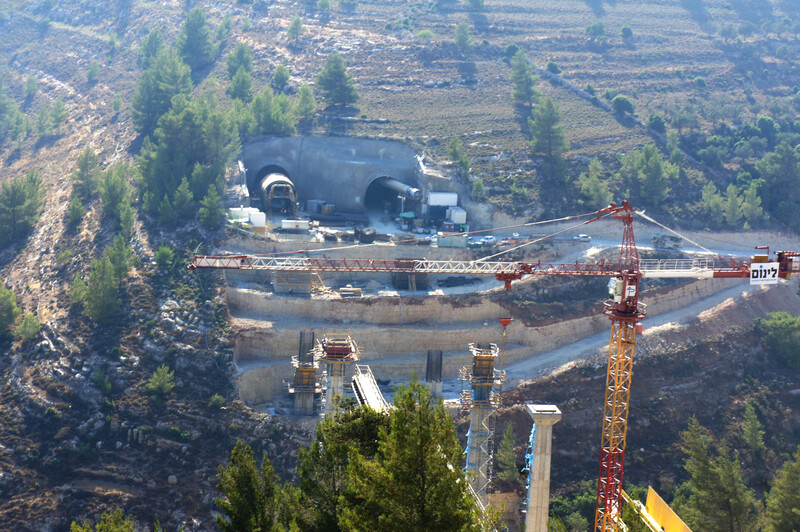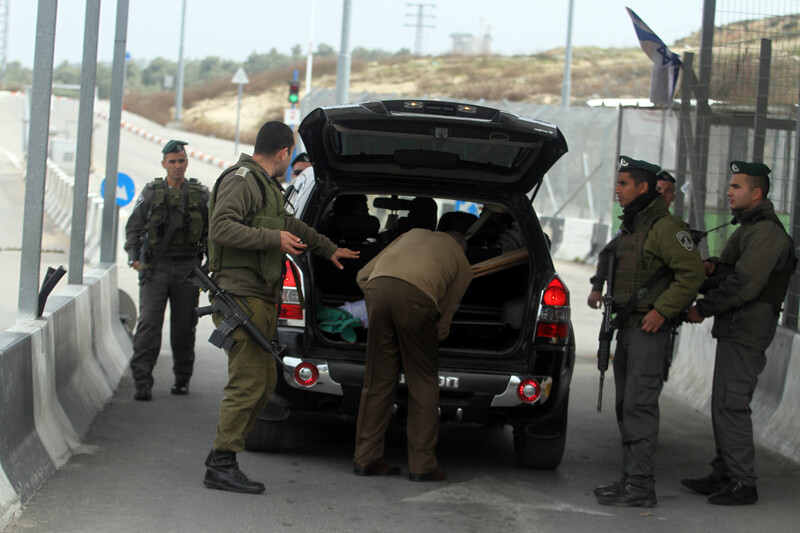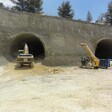The Electronic Intifada Beit Iksa 25 July 2013

Palestinian construcing a tunnel for Israeli’s high-speed railway work under highly exploitative conditions.
Palestinians hired to work on a high-speed train link between Jerusalem and Tel Aviv have half their wages taken from them by recruiting agents, an Electronic Intifada investigation has found.
An estimated 200 Palestinians are employed on boring tunnels in the West Bank, as part of the so-called A1 railway, Israel’s largest infrastructure project in a decade.
Speaking on condition of anonymity, some of these men have confirmed that they are working under highly exploitative conditions in Beit Iksa, a village near Jerusalem where two tunnels are being dug.
One man from the surrounding area said he had been recruited by someone hired to supply workers to the construction site. The person who recruited him takes over half his earnings.
“It is very unfair, for the type of work [I do,] I get half what an Israeli would,” said the worker. “I do not get a visa, or any insurance. Yet I have no choice: to work in a construction site on the other side still pays more than I would get here in the West Bank.”
Another worker said that he receives 250 shekels ($70) per day, out of the 600 shekels ($167) his Israeli recruiter is paid.
“I am happy with my employer,” he said. “In my uncle’s shop, I earned 1,500 shekels [$419] for a month but in the tunnel I earn 250 shekels a day. I am forced to work for Israel because I couldn’t earn the same money in Palestine,” he said.
“But while I get paid more, I have no insurance; if I’m injured I have no proof — like papers — to say I work there as I’m not registered. I also don’t have a permit to work in Israel.”
Workers also stated that one of their colleagues was electrocuted while working in the tunnel. He was given no money to cover his hospital treatment and was not paid for the time he had to take off as a result of the injury. Although the worker returned to his job after the electrocution, he left soon afterwards, possibly due to a disagreement with his employer.
Pillage
The revelations that workers’ rights are being abused follows previous research concluding that the route of the project is illegal as 6.5 kilometers of its route runs through the occupied West Bank, slicing into the diminishing lands of three Palestinian communities: Yalu, Beit Iksa and Beit Surik.
Who Profits from the Occupation? — a research project of the Coalition of Women for Peace — claims the train line’s route raises three legal concerns. The building of a permanent structure on occupied land not accessible to locals, the unjust appropriation of Palestinian land for the site of construction and the sale of the material mined from the digging of the tunnels on Palestinian land, all violate international law (“Crossing the Line,” October 2010 [PDF]).
Israel has contracted a handful of international companies to help with the line’s construction. While the culpability of Israel is clear, a recent legal brief by the Palestinian human rights group Al-Haq puts the role of the international firms profiting from the expropriation of West Bank land under the microscope.
Al-Haq emphasizes the role of the Italian firm Pizzarotti, which is undertaking work on the planned tunnels in partnership with the Israeli construction company Shapir Civil and Marine Engineering. The legal opinion claims there are “substantial grounds” for holding Pizzarotti responsible for violations of international law. These include the destruction of property and the war crime of pillage, which are illegal under the Fourth Geneva Convention, as well as the Rome Statute of the International Criminal Court (“Tunnelling activities and war crimes,” 8 July 2013 [PDF]).
“Politically sensitive”
Pressure from human rights organizations and activists has already led to the withdrawal of some international corporations from the project. In March 2011, the state-owned German firm Deutsche Bahn pulled out after rising pressure from activists in Berlin.
A company spokesperson commented in an email: “Because DB [Deutsche Bahn] International regards the routing of the line you mentioned as questionable in regard to international law, we explained to Israel Railways that we cannot participate in such politically sensitive projects. Our partner Israel Railways accepted our stance on this issue. This decision has no impact on other technical or engineering projects with Israel Railways and our cooperation is on a sound basis.”
An Italian group called Stop That Train has spearheaded the campaign against Pizzarotti. A number of municipalities — including that of Italy’s third largest city, Naples — have passed resolutions condemning Pizzarotti’s conduct.
Pizzarrotti did not respond to a request for comment.
Complicity

Beit Iksa village can only be accessed through an Israeli military checkpoint.
APA imagesComplicity also extends to other international companies who are profiting from contracts for their assistance with the A1 project. Moscow Metrostroy, owned by the Russian Federation, won one such contract in 2010.
The workers who spoke to The Electronic Intifada in Beit Iksa said all the machines used to dig tunnels were operated solely by Russians and Italians. The workers also said that some Australians had been involved in training engineers for the project.
A large scaffolding frame used to cement the roof of the Beit Iksa tunnel had the label Peri-up. This is a brand of the Peri group, a German construction technology giant. The Peri group website makes no reference to any involvement by the company in the Jerusalem-Tel Aviv line.
Beit Surik and Beit Iksa are the villages most affected by the train’s route. Both have already lost a great deal of land. Beit Surik lost more than 30 percent of their land as a result of Israel’s wall in the West Bank.
Beit Iksa has lost about 60 percent of its land to nearby Israeli settlements and the wall. Only around 600 dunams of the village’s land has been approved for development (a dunam is 1,000 square meters).
Some 5,000 dunams now sit in a “no man’s land” between the village and a nearby settlement.
“What is the future?”
In June 2010, the main entrance to the village was sealed. Today, the village can only be accessed through an Israeli military checkpoint.
Mohammad Gaith, a member of the village council in Beit Iksa, said: “We have lost a lot — on the land, we cannot plant, [we] cannot even visit our own olive trees. In the future they might pick up everyone in the village and throw them out. What is the future of our village?”
Gaith was informed of the A1 plan just one month before construction began. More recently, he discovered that a further 800 dunams — much of it agricultural — is to be confiscated from Beit Iksa by the Israeli authorities.
By chance, a villager found a piece of news on the Internet declaring the planned confiscation, and stating that those affected would have 60 days to lodge an appeal from the date that the confiscation was notified. By the time this information was found, the time period for appeal had already passed.
According to Gaith, no official notice was given for the planned confiscation.
Another Beit Iksa resident summed up the prevailing mood in the village: “We feel like we’re sitting in a prison.”
Jessica Purkiss is a freelance journalist living in Ramallah.

